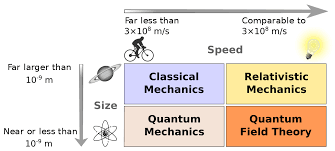Introduction to Physics:
Physics is the branch of science that deals with the study of matter, energy, motion, and the fundamental forces of nature. It seeks to understand the basic principles that govern the behavior of the universe, from the smallest subatomic particles to the vast expanses of space.
Key Concepts:

- Classical Mechanics: Classical mechanics, developed by Isaac Newton, describes the motion of macroscopic objects under the influence of forces. It includes concepts such as Newton’s laws of motion, momentum, energy, and gravitation.
- Thermodynamics: Thermodynamics deals with the study of heat and its relation to energy and work. It encompasses concepts such as temperature, heat transfer, entropy, and the laws of thermodynamics.
- Electromagnetism: Electromagnetism is the study of electric and magnetic fields and their interactions with charged particles. It includes Maxwell’s equations, which describe how electric and magnetic fields propagate through space.
- Quantum Mechanics: Quantum mechanics is the branch of physics that deals with the behavior of particles at the atomic and subatomic levels. It introduces concepts such as wave-particle duality, quantization of energy levels, and the uncertainty principle.
- Relativity: Relativity theory, developed by Albert Einstein, describes the behavior of objects moving at speeds close to the speed of light or in strong gravitational fields. It includes special relativity, which deals with the motion of objects in inertial frames of reference, and general relativity, which extends these principles to accelerated frames and gravitational fields.
- Particle Physics: Particle physics explores the fundamental constituents of matter and the forces that govern their interactions. It involves the study of subatomic particles such as quarks, leptons, and bosons, as well as the fundamental forces of nature, including the strong nuclear force, weak nuclear force, electromagnetism, and gravity.
- Astrophysics and Cosmology: Astrophysics focuses on the study of celestial objects such as stars, galaxies, and black holes, as well as the universe as a whole. Cosmology seeks to understand the origin, evolution, and ultimate fate of the universe.
- Nuclear Physics: Nuclear physics deals with the study of atomic nuclei and their interactions, including nuclear reactions, radioactive decay, and nuclear fusion.


